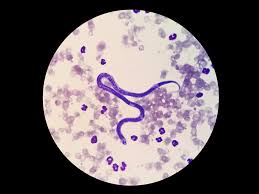New Possibilities for Treating Canine Heartworm Disease
By: Sharon M Albright, DVM, CCRT, AKC Canine Health Foundation
 Current heartworm treatments for dogs come with the risk of complications such as pain, fever, blood clots, and more. Thanks to funding from the AKC Canine Health Foundation (CHF), investigators at the University of Illinois are exploring a new class of drugs to treat this deadly parasite (CHF Grant 02986: Catechol O-Methyltransferase as a Molecular Drug Target in Heartworm).
Current heartworm treatments for dogs come with the risk of complications such as pain, fever, blood clots, and more. Thanks to funding from the AKC Canine Health Foundation (CHF), investigators at the University of Illinois are exploring a new class of drugs to treat this deadly parasite (CHF Grant 02986: Catechol O-Methyltransferase as a Molecular Drug Target in Heartworm).
Investigators identified an enzyme, called DiMT, that is found in nematode worms (like heartworms) but NOT in mammals. This enzyme inactivates a group of neurotransmitters known as catecholamines, preventing them from building up inside the worm. This function is critical since a build-up of catecholamines prevents the worm from moving, feeding, or reproducing and will lead to worm death.
Could drugs that disable the DiMT enzyme be used to kill worms and treat heartworm infection in dogs? To find out, CHF-funded investigators tested thousands of compounds known to disable enzymes similar to DiMT. They identified three compounds that were increasingly effective at killing heartworms based on the concentration exposure – that is, greater compound exposure resulted in greater worm death. They also tested these three compounds in various combinations and found that they acted synergistically – having a greater effect in combination than when given alone. This is helpful since it allows the use of lower doses of each compound, reducing the risk of adverse effects or the development of parasite resistance.
The DiMT enzyme is a promising target for a new class of drugs to treat heartworm infection in dogs. Since dogs do not have this enzyme, the risk for adverse effects during treatment should be low. This research was completed using immature heartworms extracted from canine blood samples. Future studies will explore how effectively this class of drugs treats naturally infected dogs. If successful, veterinarians will have a safer and more effective tool to treat canine heartworm infections in the coming years. Learn more about ongoing CHF-funded research into heartworm diagnosis and treatment at akcchf.org/immunologyRPA.
From AKC Canine Health Foundation
Short URL: http://caninechronicle.com/?p=309110
Comments are closed












